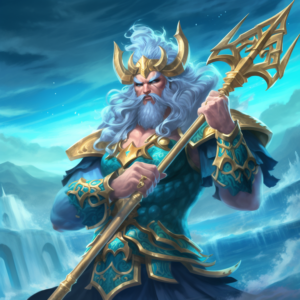Neptune is known as the Roman god of the Sea. In Roman religion and mythology, Neptune, also called Neptunus, was originally regarded as the god of fresh water, as opposed to salty sea water. He may have arisen as a sky god, casting lightning bolts instead of his throwing his trident. Or he may have initially been viewed as a fertility god, sending up springs of water from the earth.
By 399 B.C., he was seen as equivalent to the Greek sea god Poseidon. Thus, his domain changed from freshwater springs to that of the ocean and sea. His former role as a deity of fresh water was filled by the deity Salacia, the goddess of “leaping springwater.”
Origins
Unlike many of the gods of Rome, Neptune has his origins in the Latin culture of Rome. The role of Neptune changed when the Roman Empire came into contact with Greece and absorbed much of its religion.
Neptune shares an origin story with several gods who were born to his parents, Saturn and Ops. The traditional version of the story of Neptune’s birth focused on Saturn’s father, revealing a prophecy of doom for the god at the hands of one of his children. Saturn decided to eat the children as they were born, including Neptune. Ops tricked Saturn into eating a rock after he had eaten five of his six children. All five children were regurgitated by Saturn to return to the world and take up their roles as gods, including Neptune.
Appearance
The classic depiction of Neptune is of an old man with long hair and a grey beard. He is often shown as one of the oldest-looking gods of Ancient Rome in classical and modern artworks. What makes him one of the most recognizable gods of Rome is his trident that he carries as he moves beneath the ocean waves.
Family
Neptune is one of the early gods of Rome who date back beyond the earliest contact with the Greek culture. He was one of the six children of Saturn and Ops. His siblings include Jupiter, Juno, Pluto, Ceres, and Vesta. Neptune and his brothers, Jupiter and Pluto, defeated their father in battle and agreed to take control of the three realms of the world. Neptune became the ruler of the seas, Jupiter took control of the sky, and Pluto oversaw the underworld.
Neptune is often accompanied by a wife. In early incarnations, she is Salacia, the goddess of saltwater. After the Romans made contact with the Greeks, Neptune’s myth was added to and includes his better-known wife, Amphitrite. The couple had three children, including the merman, Triton. The myth of Neptune in Roman culture included numerous children fathered by other women, including Pegasus and Atlas.
Symbols
The main symbol associated with Neptune is that of the three-pronged fisherman’s spear or trident. In later stories about him, his trident has special powers that can inflict pain on his enemies.
Because of his role as the god of the sea, he is closely linked to fish and animals usually found in the oceans of the world. In early versions of the myths including Neptune, the god of the sea is seen driving a chariot pulled by a horse. This affiliation with horses led to him being named the god of horse racing in Roman culture.
Powers & Duties
In the early Roman myths, Neptune did not have a major role to play in the oceans and seas of the nation. The birth of the Roman Empire led to more of an interest in the seas, which led to the need for him to protect ships traveling the oceans of the world. Neptune was known for his violent temper and how fast he would move to anger, with the volcanoes around Rome erupting at times when he had been annoyed or made angry. The affinity of Neptune for the creatures of the sea allowed him to communicate with these animals, as he moved quickly between bodies of water.
Myths & Stories
The myths of Neptunus borrow heavily from those of the Greek Poseidon. In one myth, Neptunus fell in love with the Nereid Amphitrite, who is sometimes said to be a mermaid and is at other times more human in form. Amphitrite resisted Neptunus’ affections, but eventually they were married. They had a son named Triton, who was a merman – human from the waist up, but bearing a fish’s tail instead of legs.
Later, Amphitrite became angry and vengeful due to her husband’s affinity for human women and goddesses alike. In Homer’s Odyssey, for example, her husband disguised himself and fathered twins by a human maiden, hidden from view by towering waves at the mouth of a river. On another occasion, he pursued Ceres as she searched for her daughter, Prosperine, who had been taken to the underworld. When Ceres turned herself into a mare in order to escape him, he became a stallion in order to mate with her.
In another legend, Neptunus battled with Minerva (or, the Greek Athena) for control of great cities. They had a contest of creation; Minerva created an olive tree, and Neptunus brought forth the first horse. Minerva was named victorious by the gods and kings, so in anger, Neptunus flooded the land.
In another flood myth, Jupiter wished to punish the mortals for their wickedness. According to the poet Ovid, Neptunus “struck the earth with his trident; it trembled and with the quake laid open paths for the waters.” In a manner reminiscent of the Bible’s Noachian flood, humans, animals, and architecture were destroyed, until only one man and one woman remained. Jupiter then worked to reverse the flood, with Neptunus’ son Triton using his conch shell as a horn to call the waters back the riverbeds and the seabed.
Art
In art and statue, Neptunus was often depicted as being muscular and bearded, holding a trident, or three pronged spear used in fishing. His appearance was rough and ferocious, mirroring the dangerous storms of the sea. He rode a chariot pulled by seagoing horses who sported both equine hooves and the tails of fish. At other times, he rode standing on their backs. Dolphins may accompany Neptunus or replace his horses.
Worship
A temple to Neptune could be found in Rome’s Circus Flaminius, a large track for horse racing. The temple featured sculptures of the Greek Poseidon, the Nereid Thetis, and other sea deities. According to book Jewish Antiquities by the historian Flavius Josephus, Octavian Augustus built a temple to Neptune in Nicopolis after he attained a naval victory over Antony and Cleopatra. The temple was erected on the location at which his personal tent had stood.
Another temple was built in 25 B.C. in the Campus Martius. It was there that the Neptunalia was held on July 23. As a god of the water, Neptune’s festival was naturally held in the hottest part of summer, when water was most difficult to find. This petitioning for drinkable water was likely left over from his former role as a god of springs.
Neptune was considered a patron of sailors, but was not as popular as his Greek counterpart had been. Neptunus was most widely heralded as Neptune Equester, the patron deity of horses and horse racing.
Today
Like many of his mythological counterparts, Neptune’s legacy continues among the sciences. The planet Neptune was named after this god, as its blue coloration resembles a vast sea. Neptune’s largest moon is named after the deity’s son, Triton. The silvery metal neptunium (Np), element 93 on the periodic table, was named after the planet, and thus after the god himself.
Facts about Neptune
- Neptune is the Roman god of the Sea.
- He is also the god of fresh water and earthquakes.
- He and four of his siblings were eaten by their father, Saturn.
- The Greek equivalent to Neptune is Poseidon.
- In mythology, Neptune was said to be married to a mermaid, Amphritite.
- Neptune had five siblings, including Jupiter, Ceres, Pluto, Vesta and Venus.
- Neptune is sometimes portrayed as riding in a chariot pulled by dolphins.
- He is sometimes referred to as Neptune Equester, the Roman patron of horse-racing.
- The most prominent symbol associated with Neptune is his trident.
- Poseidon’s trident was the object that was sought after in Pirates of the Caribbean – Dead Men Tell no Tales.
- Neptune is the eighth planet from the Sun. It has a bright blue color from the methane in its atmosphere.
- A large statue of the god can be found at the entrance of Neptune Park in Virginia Beach.






